
If a baby uses a pacifier for a long time, the baby is at risk of open bite, buck teeth... - Illustration photo
Pacifiers have long been a popular item in the care of infants and young children. Many parents consider them a "savior" to help children stop crying, sleep easily and give parents more time to rest and work.
In fact, the habit of sucking on a pacifier is common, a natural phenomenon in young children. However, what many parents do not fully understand is that this seemingly harmless habit can have long-term effects on the development of the child's jaw, teeth and face.
According to international statistics, up to 63% of children aged 0-6 have used pacifiers. Most of them stop at the age of 2-4, but a significant proportion continue to the stage of permanent teething. From here, dental, language, ear, nose and throat and psychological problems begin to appear.
Risks from common habits
Thumb or pacifier sucking behavior occurs in most young children. As early as the 15th to 20th week of pregnancy, many fetuses have been observed sucking their thumbs on ultrasound images. After birth, the baby continues to maintain this reflex as a self-defense and self-soothing instinct.
Many studies show that about 63% of children aged 0-6 have used a pacifier at least once. The highest rate falls in the 0-2 age period, then gradually decreases but still exists in some older children.
Usually, children will give up this habit by the age of 4. If the habit continues when permanent teeth begin to grow (around age 6), the risk of malocclusion and jaw deformities will increase significantly.
Why do babies like to suck on pacifiers?
Safety and comfort needs: Young children use pacifiers or thumb sucking as a way to comfort themselves, especially when separated from their parents, facing strangers or new environments. This behavior helps children reduce stress and sleep better.
Medical benefits in some situations
• Increased pain threshold: Pacifiers help reduce discomfort during minor medical procedures.
• Sleep aid: In children 1-4 years old, sucking on a pacifier helps reduce heart rate while sleeping, allowing for deeper sleep.
• Weight gain in premature babies: When combined with music , pacifiers stimulate premature babies to suckle, increasing the effectiveness of nutrient absorption.
• Reduces the risk of sudden infant death syndrome: Research shows that pacifiers during sleep help change the position of the tongue, increase the tone of the respiratory muscles, and stimulate breathing - thereby reducing the risk of this syndrome. However, due to its potential side effects, they recommend it only for children under 1 year old.
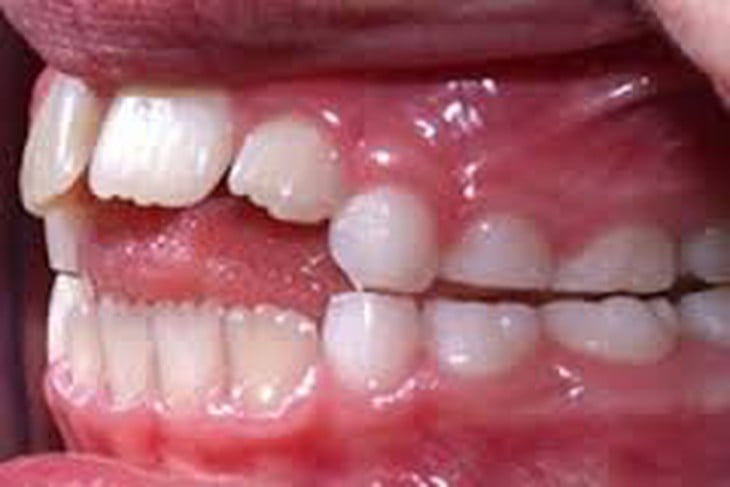
Case of child with protruding front teeth related to pacifier - Photo: BSCC
Unpredictable consequences
The above benefits are only effective when the child is young and used for a short time. When the habit lasts for a long time, pacifiers will bring many unpredictable consequences to the child's maxillofacial and psychological development.
Misaligned teeth and jaws
- Open bite: The upper and lower front teeth do not touch each other when biting.
- Protruding front teeth: Upper front teeth protrude forward, lower front teeth recede.
- Narrow jaw, cross bite: The prosthesis makes the upper jaw narrow and the canine teeth misaligned.
- Permanent malocclusion: If it persists after the age of 4, these misalignments can last a lifetime, requiring complex orthodontic treatment.
Tooth decay: Continuous use of a pacifier for 18 months is a high risk factor for tooth decay, possibly twice as high as in the group that does not use a pacifier.
Delayed speech and limited language development: Children who use pacifiers for a long time are 3 times more likely to have delayed speech. Pacifiers fill the mouth, limiting the ability to babble and imitate sounds. Many experts believe that parents "buy silence" at the cost of their children's language development.
Risk of otitis media : There are studies showing that pacifier use in children under 4 years old doubles the risk of recurrent otitis media. The reason is that bacteria can easily spread from the nose to the middle ear.
Psychological and emotional effects: Boys who use pacifiers frequently have poorer ability to mimic facial expressions and lower emotional intelligence scores as adults. This phenomenon has been compared to Botox injections that numb facial muscles, limiting expression. Girls are less affected, possibly due to flexibility in emotional development.
Pacifier addiction: The child may become dependent and unable to sleep without the pacifier. When the parent withdraws, the child cries violently, causing mental stress for the whole family.
Effects on breastfeeding: Babies can have "nipple confusion": their tongue is in the wrong position, they refuse to breastfeed. Breastfeeding less often causes the mother to produce less milk, and the baby lacks valuable nutrients.
- Besides, there may be risks: Children choking or suffocating when the pacifier falls; Allergy to the plastic used to make the pacifier; Infection if hygiene is poor.
How to help children break habits?
To eliminate the habit of sucking on a pacifier, there are many different ways to do it: (1) Abruptly interrupt. (2) Parents explain to the child the bad consequences of the habit, friends may laugh at. (3) Apply an unpleasant substance to the pacifier. (4) The dentist will advise the child to quit by explaining and asking the parents to hang up incentives for the child.
In addition, there are now orthodontic pacifiers, designed to limit the negative impact on the jawbone. However, this is only a temporary solution, not a substitute for timely withdrawal.
Practical advice for parents:
• Wean off pacifier before 3-4 years old.
• Maintain exclusive breastfeeding for the first 6 months, combined with breastfeeding until 2 years of age.
• Wean slowly: reduce the time of use during the day, only let it be taken when sleepy, then eliminate it completely.
• Reward and encourage your child to be proud of giving up the pacifier.
• Take your child for regular dental check-ups to detect malocclusion early.
There is no denying that in many cases, pacifiers are a "useful tool" to help babies calm down, relieve pain, improve sleep, and support premature babies. But the truth is that the benefits only last for a short time and under the right conditions. When parents abuse or delay weaning, pacifiers will turn from "friends" to "culprits" causing many long-term consequences for children's health and aesthetics.
The most important message is:
• Use at the right time (children under 1 year old, after breastfeeding well).
• Use properly (clean, safe, no dangerous strings).
• Wean at the right time (before 3-4 years old).
Source: https://tuoitre.vn/thoi-quen-mut-num-vu-gia-va-nhung-he-luy-den-rang-mieng-ngon-ngu-tai-mui-hong-cua-tre-20251001114946802.htm



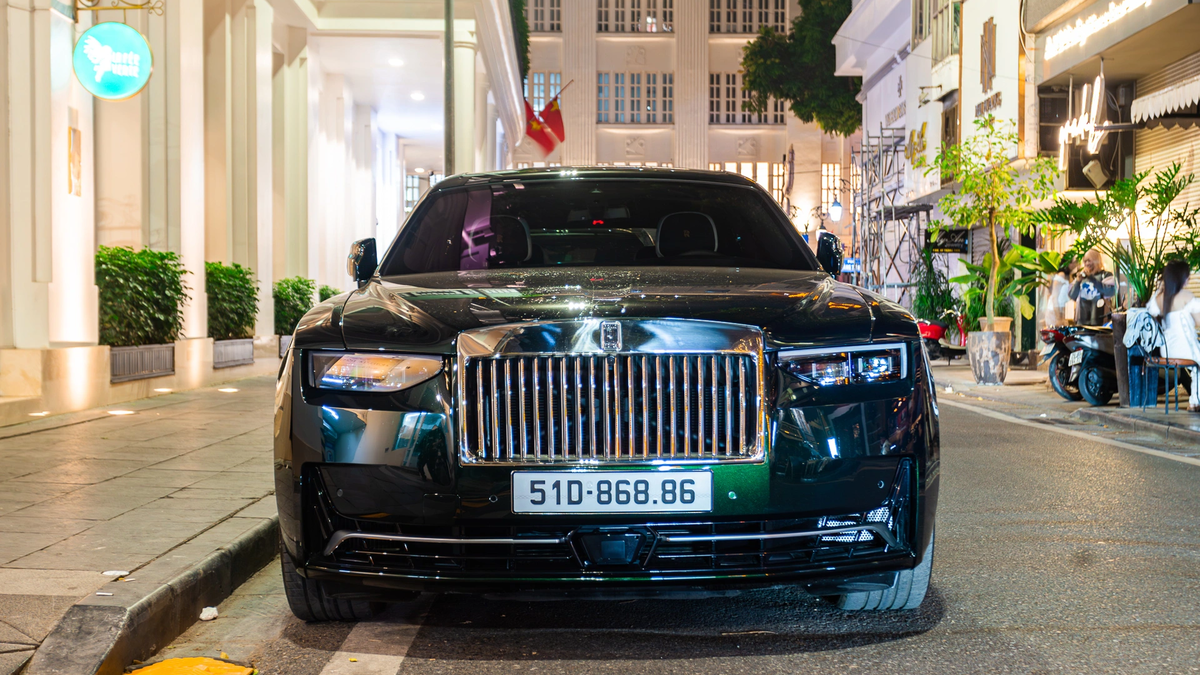
![[Photo] Prime Minister Pham Minh Chinh meets with representatives of outstanding teachers](https://vphoto.vietnam.vn/thumb/1200x675/vietnam/resource/IMAGE/2025/11/15/1763215934276_dsc-0578-jpg.webp)
![[Photo] General Secretary To Lam receives Vice President of Luxshare-ICT Group (China)](https://vphoto.vietnam.vn/thumb/1200x675/vietnam/resource/IMAGE/2025/11/15/1763211137119_a1-bnd-7809-8939-jpg.webp)


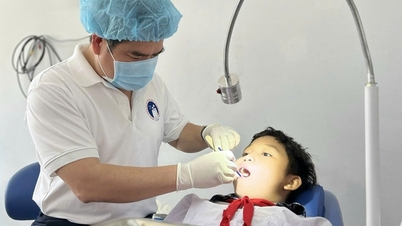













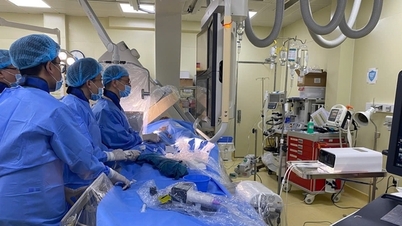










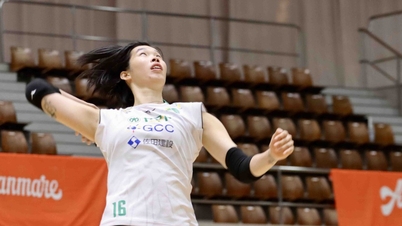











































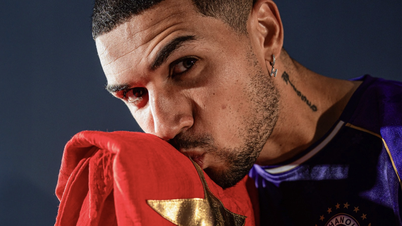













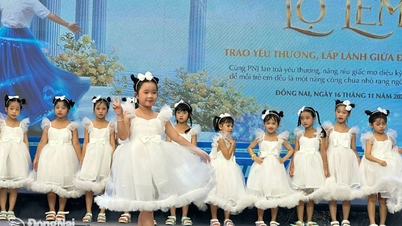












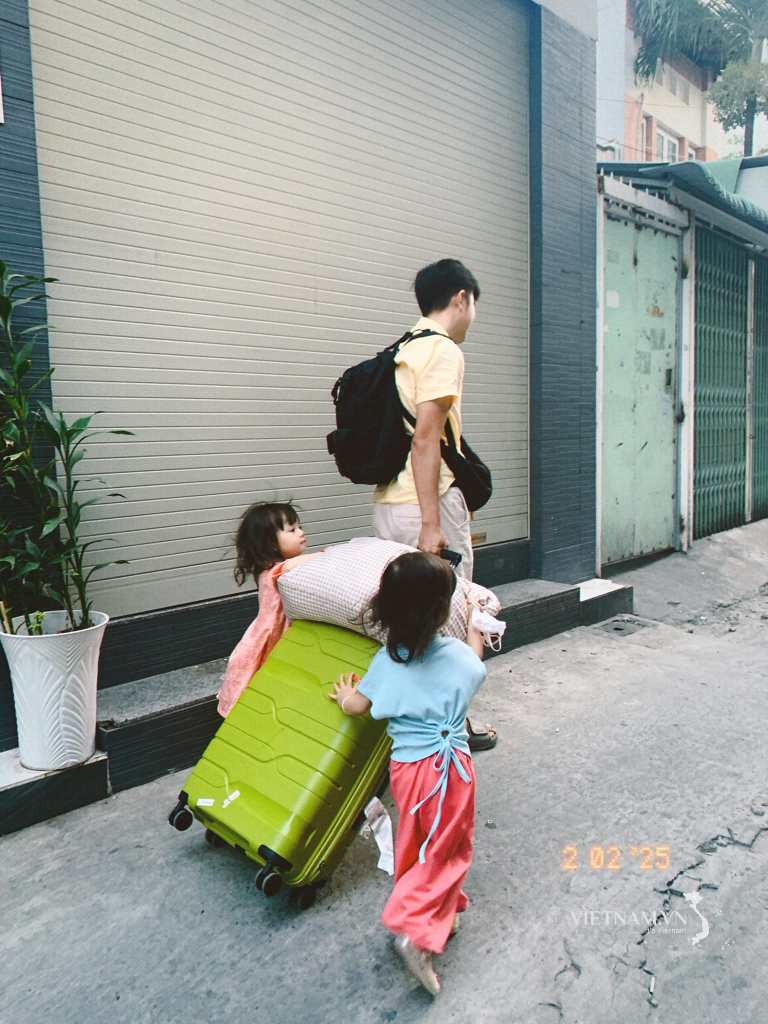


Comment (0)